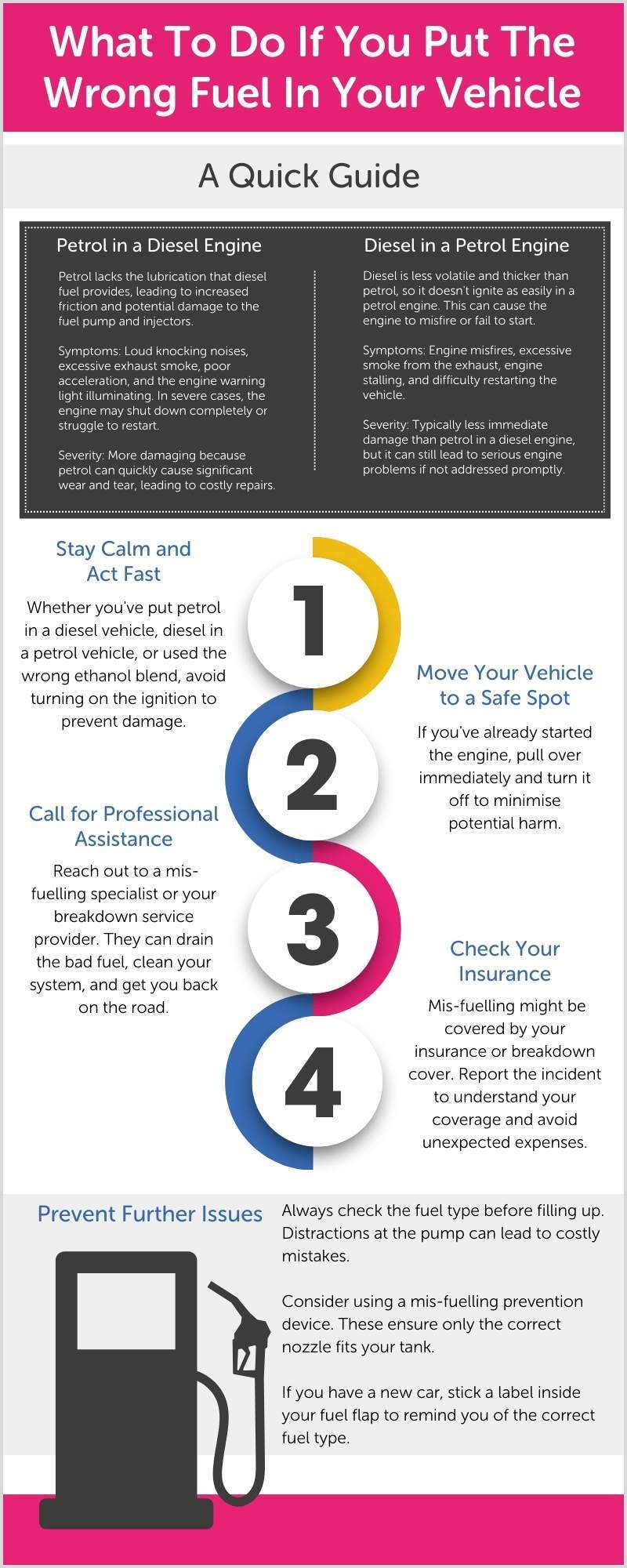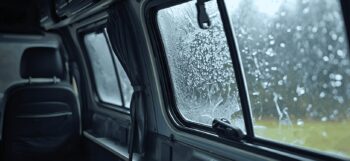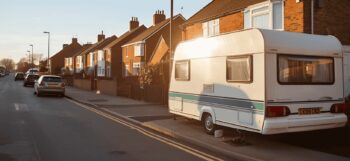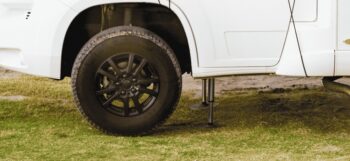Mis-fuelling your vehicle can be an alarming experience, but it's more common than you might think.
Whether you've accidentally put petrol in a diesel car or diesel in a petrol car, the key is to remain calm and take the right steps to minimise damage to the engine. This guide takes you through what you need to do, if you find yourself in this situation. It also aims to help you to understand the potential consequences of mis-fuelling and how to avoid it in the future.
Putting petrol in a diesel car
Diesel engines rely on diesel fuel to lubricate the internal components. It’s worth noting that even the smallest amount of petrol added to diesel engine can affect its functionality. Petrol, being much thinner and less oily than diesel, strips away this lubrication, which can cause significant damage to the fuel pump and other mechanisms such as fuel lines. More serious long-term damage can cause engine seizure or damage to the catalytic convertor.
If you've put petrol in a diesel car, you might experience:
- A knocking noise during acceleration
- Smoke emitting from the exhaust
- Slower acceleration than normal
- The engine warning light may come on
- Difficulty restarting the car
- The engine shutting down completely
Putting diesel in a petrol engine
Petrol engines are not designed to handle the thicker, oilier diesel fuel. Although putting diesel in a petrol car is less serious than putting petrol in a diesel car, it can still clog the fuel filter and spark plugs.
If you've put diesel in a petrol car, you might encounter:
- Engine misfires
- Excessive exhaust smoke
- The engine cutting out
- The engine refusing to restart
What to do if you miss-fuel your vehicle
Immediate actions
Do Not Start the Car: If you realise your mistake before starting the engine, do not turn it on. This will prevent the wrong fuel from circulating through the engine, reducing potential damage.
Inform Petrol Station staff: The staff at the petrol station may have encountered this issue before and may be able to offer advice or assistance. They can also help you contact a recovery service.
Call for Assistance: Contact a breakdown service provider immediately. Many UK breakdown services are equipped to deal with mis-fuelling incidents.
Contact a Mis-fuelling Specialist: Many companies in the UK specialise in draining the wrong fuel from vehicles. These services are often mobile, meaning they can come to your location and fix the problem on-site.
If you’ve already driven:
If you’ve already driven after mis-fuelling, stop as soon as it’s safe to do so. Continuing to drive will only increase the potential damage. Watch out for signs of damage such as knocking noises, reduced power, or difficulty starting. These could indicate that the wrong fuel has already started to cause problems within the engine.

Putting E10 fuel in an incompatible vehicle
E10 fuel is a type of petrol that contains up to 10% ethanol, a renewable biofuel made from plant starches and sugars.
It was introduced in the UK in September 2021 to reduce the Nation’s carbon emissions as ethanol produces fewer greenhouse gases when burned compared to traditional fossil fuels.* However, not all vehicles are compatible with E10 fuel, particularly older models and some classic cars.
If you accidentally fill up with E10 fuel in a vehicle that is incompatible, here’s what you should do[i]:
- A one-time, accidental fill-up with E10 is unlikely to cause immediate or severe damage, so there's no need to panic. An incompatible car will still run on E10, but seals, plastics and metals may be subject to damage if E10 is used over longer periods, due to its corrosive properties.
- If possible, dilute the E10 by adding the correct fuel, E5 or standard unleaded, to the tank as soon as possible to minimise the ethanol concentration.
- Pay close attention to how your vehicle is performing. If you notice any unusual noises, reduced performance, rough idling, or stalling, it may be a sign that the E10 fuel is affecting your vehicle.
- If your vehicle is particularly old or if you’re concerned about potential damage, you may want to have the fuel tank drained and refilled with the appropriate petrol by a professional.
- If you’re unsure about your vehicle's compatibility or if you experience any issues after using E10, it's wise to contact a garage. A mechanic can assess any potential damage and recommend necessary repairs and/or preventive measures.
Costs of mis-fuelling
Repairing a vehicle after mis-fuelling can be costly. Depending on the extent of the damage, you might need to pay for a complete fuel system flush, replacement of damaged components, or even more extensive repairs.
How to avoid mis-fuelling in the future
- Always take a moment to ensure you’re using the correct pump. Look at the pump nozzle, and make sure it matches your car’s fuel type.
- Some drivers place a small sticker on the fuel cap or dashboard to remind them of the correct fuel type.
- Misfuelling often happens when you’re in a rush. Slow down and take the time to refuel carefully.
Cover for unforeseen mishaps
We’ve partnered with Britain’s most experienced breakdown provider, the RAC, to offer you peace of mind while motoring.
With the RAC not only do you get unlimited call outs, free roadside labour, no call out fee and unlimited roadside repair time, but RAC Car Breakdown Cover and RAC Motorhome Breakdown Cover includes cover for mis-fuel rescue.**
If your vehicle has broken down due to a mis-fuel in the UK, RAC can offer the following roadside solutions, such as drain, flush and clean out the fuel system or fill the vehicle with up to 10 litres of fuel to get the vehicle mobile to allow you to drive to the nearest fuel station. If they are unable to repair the vehicle due to mechanical damage caused by the mis-fuelling, they can recover the vehicle and passengers to a destination chosen by the driver up to a maximum of 10 miles from the breakdown site. If more than five people require transportation they may need to provide transport in separate vehicles.
For more information on RAC Car Breakdown Cover, RAC Motorhome Breakdown Cover and other every day insurances visit https://www.lifesure.co.uk/ or speak to one of our knowledgeable agents on 01480 402 460.
*Information on E10 Fuel taken from https://www.fuelsindustryuk.org/consumer-information/e10-petrol/
** Terms and conditions, limitations, exclusions and acceptance criteria apply.
[i]Information taken from https://www.rac.co.uk/drive/ad...
Disclaimer: The sole purpose of this article is to provide guidance on the issues covered. This article is not intended to give legal advice, and, accordingly, it should not be relied upon. It should not be regarded as a comprehensive statement of the law and/or market practice in this area. We make no claims as to the completeness or accuracy of the information contained herein or in the links which were live at the date of publication. You should not act upon (or should refrain from acting upon) information in this publication without first seeking specific legal and/or specialist advice. Lifesure Group Limited trading as Lifesure and Lifesure Insurance Broker accepts no liability for any inaccuracy accepts no liability for any inaccuracy, omission or mistake in this publication, nor will we be responsible for any loss which may be suffered as a result of any person relying on the information contained herein.
FP1288-2025











